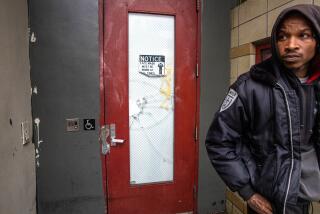Judge Approves Investors’ Choice for Shelter Firm : Bankruptcy: Creditors of Tustin’s Metro Display get a trustee who they say can help save the company, now the target of a federal lawsuit. The SEC’s bid for an independent overseer is rejected.
- Share via
SANTA ANA — A bankruptcy judge Wednesday acceded to the wishes of an enthusiastic crowd of investors by refusing a government request to appoint an independent trustee to oversee a troubled bus-shelter company in Tustin.
Instead, Judge John E. Ryan decided to pick as Metro Display Advertising Inc.’s new boss an executive whom the creditors had helped to select.
The federal bankruptcy judge made his decision after receiving assurances that the company’s longtime president, Jean Claude LeRoyer, will step aside. The Securities and Exchange Commission alleges in a lawsuit that LeRoyer was the mastermind of a $48-million pyramid investment scheme and diverted money for his own purposes.
“I cannot think of any case in which the creditors have come together in a solid theme,” said Ryan, who praised the scores of bus shelter owners who packed two courtrooms for the hearing for their resolve to return the company to financial health.
Metro Display, which does business as Bustop Shelters of California, filed for Chapter 11 bankruptcy protection last week. Bus shelter investors were told Saturday that the move was largely taken to hold off SEC attempts to liquidate the company.
The SEC filed a lawsuit Monday, alleging that the company sold its glass-and-metal shelters to 4,500 or more investors for nearly $10,000 each in a Ponzi, or pyramid, scheme.
The company depended on the sales of shelters, many of which were never installed, as its major money source, rather than ad revenue, the suit alleges.
In light of the allegations, which are based on statements of Metro Display officials who have since left the company, the SEC wanted an independent trustee to protect the interests of creditors.
But SEC attorneys were roundly booed by investors in court when they argued that they were acting in the investors’ best interests.
The investors instead, through their attorney, Leonard M. Shulman, asked the judge to let the company appoint its own interim president, Robert F. Bicher. With a strong financial background, Bicher is a veteran trustee who said he has supervised hundreds of Chapter 11 proceedings.
The investors feared that the appointment of an independent trustee could hasten the likelihood of liquidation, which would probably result in meager returns on their investments. They believe that Bicher will support a plan to convert their shelter ownership agreements into stock.
As part of the deal, LeRoyer will be removed from control of the company. He is already prohibited by court order from selling more bus shelters to investors. His attorney, Thomas J. Nolan, said LeRoyer will be limited to representing the company in talks with cities and counties where Metro Display has contacts to place bus shelters.
Nolan denied that LeRoyer ever tried to engage the company in fraud or that he stole more than $800,000, as the SEC alleges.
The money, he said, was part of a loan from the company.
An SEC attorney, Sarah Moyed, told the judge that the company had been uncooperative in producing documents as part of the investigation and that LeRoyer had exercised his Fifth Amendment rights against self-incrimination during questioning.
Investors at the hearing, however, said they still support LeRoyer. They also lauded the judge’s decision.
“I think it will set a precedent,” said Allen Fortson of Costa Mesa, a shelter owner who was impressed that Ryan allowed a stock conversion plan to go forward. “I don’t think anything like this has taken place anywhere before.”
Dick Engbaum of Mission Viejo, one of the leaders of the shelter owners’ group, said he and other investors have inspected the company’s records and have accounted for all but 2% or 3% of its accounts.
Even if LeRoyer borrowed $800,000 or more during his eight-year tenure, that is fairly insignificant, given the effort LeRoyer made on the firm’s behalf, he added.
Engbaum said the SEC case has subjected the company to a rash of bad publicity that has to be repaired. But he expressed confidence that the shelter owners can turn Metro Display into a moneymaker.
“We’re going to turn this company around. We believe in this company,” he said.
More to Read
Inside the business of entertainment
The Wide Shot brings you news, analysis and insights on everything from streaming wars to production — and what it all means for the future.
You may occasionally receive promotional content from the Los Angeles Times.










